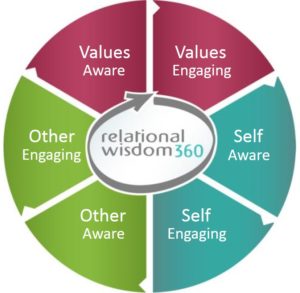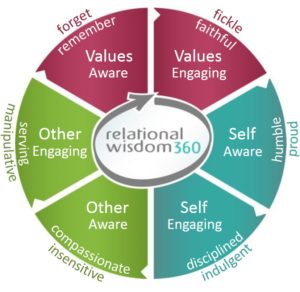Introduction to Relational Wisdom
This is the first of five linked articles designed to introduce you to the basic principles of the values-based (secular) version of relational wisdom. At the end of each article, you will find a link to the next recommended article in this series.
For a one-page summary of the the key principles of values-based relational wisdom and peacemaking, click here.
Why?
Why do some people seem to have closer and more enduring friendships and marriages than others?
Why do they perform so well in the workplace and advance so quickly in their careers?
How do they maintain such a close and influential connection with their children and relatives?
Why do they seem to have less conflict, and when it does arise, why are they so good at resolving it quickly and completely?
And why do their relationships frequently serve as an inspiring example to others?
A Better Kind of Smart
Well, it’s seldom because they’ve got a higher IQ than others. Studies have consistently shown that high intelligence quotients do not automatically translate into success at home or in the workplace.
There is another kind of smart, however, that correlates strongly with success in all aspects of life. It’s typically referred to as “wisdom.”
Wisdom can benefit us in every area of life, including money management, physical health, sexuality, politics, families, friendships and employment. Having spent thirty years reconciling people estranged by conflict, I’ve been particularly interested in the principles of wisdom that apply to relationships in the home, workplace and church.
I call this group of principles relational wisdom, or simply RW. These timeless concepts can improve every aspect of our lives.
RW Definition and Paradigm
Relational wisdom may be defined as the ability to discern emotions, interests and abilities in yourself and others, to interpret this information in the light of your personal values, and to use these insights to manage your responses and relationships constructively.
As you learn these skills, you can experience stronger relationships and less conflict at home, with your friends, and in the workplace, as well as improved team-building, better job performance and career advancement.
The key principles of relational wisdom may be organized in terms of six core skills or disciplines that are grouped into three pairs. One pair focuses on how we how we live out our values, another on how we relate to ourselves, and the third on how we relate to others.

Values-aware, Values-engaging
Self-aware, Self-engaging
Other-aware, Other-engaging
These six skills are closely linked and reinforce one another in a circular direction (thus the “360” in our ministry name). The better we know and follow our values (values-aware, values-engaging), the more we will know and discipline ourselves (self-aware, self-engaging), which opens the way for us to better understand, relate to and serve our neighbors (other-aware, other-engaging).
Skills Defined
The six RW skills can be described by more common synonyms, such as remember, faithful, humble, disciplined, compassionate, and serve. Thus, these six skills can summarized in the following definitions and synonyms.
Values-awareness (remember) is your ability to honestly identify your true personal values.
Values-engagement (faithfulness) is your ability to consistently apply your values in real life.
Self-awareness (humility) is the ability to accurately discern your own emotions, thoughts, values, interests and abilities.
Self-engagement (discipline) is the ability to manage your thoughts, emotions, words and actions constructively.
Other-awareness (compassion) is the ability to understand and empathize with the experiences, emotions, values and interests of others.
Other-engagement (service) is the ability to love, encourage, serve and resolve differences with others in a mutually beneficial way.
 Inside, Outside
Inside, Outside
These definitions describe the ideal for each skill. When we apply them consistently, we are able to live inside the circle of relational wisdom. This generally results in peaceful and fulfilling relationships with the people around us.
But if we fail to apply these skills, we are living outside the circle of relational wisdom. Instead of remembering our values, we forget them. Instead of being faithful to our convictions, we are fickle. We are proud instead of humble, indulgent rather than disciplined, insensitive instead of compassionate, and manipulative rather than serving.
You Can Improve Your Relational Wisdom!
Unlike your IQ (intelligence quotient), which does not change noticeably after the teen years, your
relational wisdom can improve significantly if you are willing to work at it.
Psychologists who study relational skills attribute our ability to change to the “plasticity” of our minds. As Daniel Goleman writes in his New York Times best-selling book, Emotional Intelligence:
The brain continually reshapes itself according to the experiences we have. If we are changing a habit-say trying to get better at listening-then that circuitry will grow accordingly.
If you want to improve your relational skills, we invite you to take advantage of our interactive online course, Exploring Relational Wisdom 3.0, which is designed to help you steadily improve the six skills of relational wisdom.
–Ken Sande
To see a faith-based version of these concepts, visit www.rw360.org.


 Inside, Outside
Inside, Outside



5 Responses to "Discover Relational Wisdom"